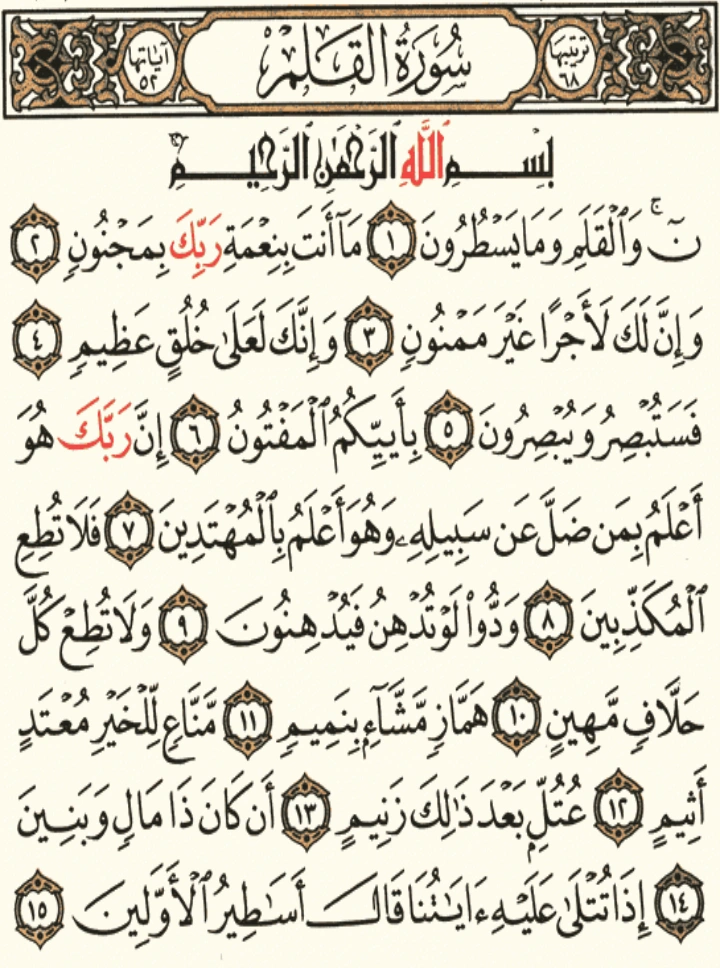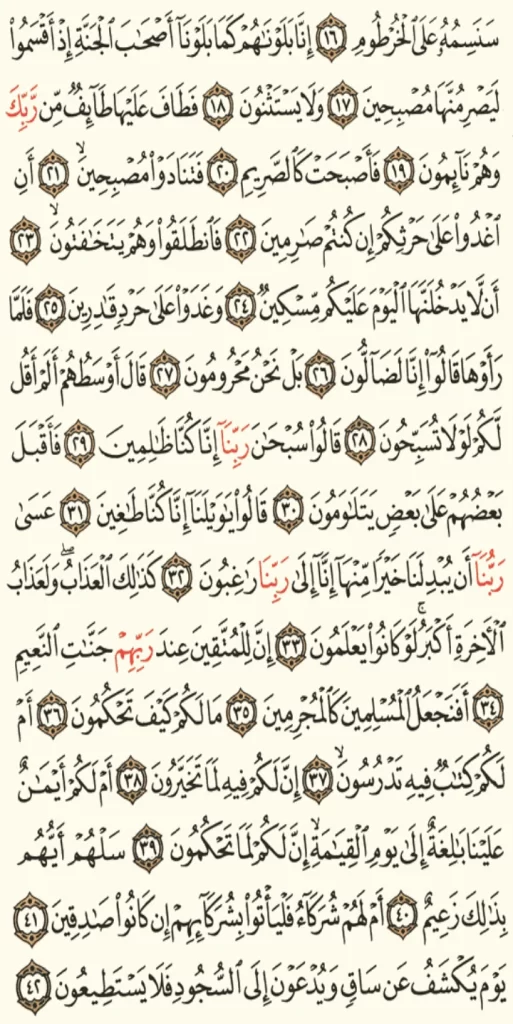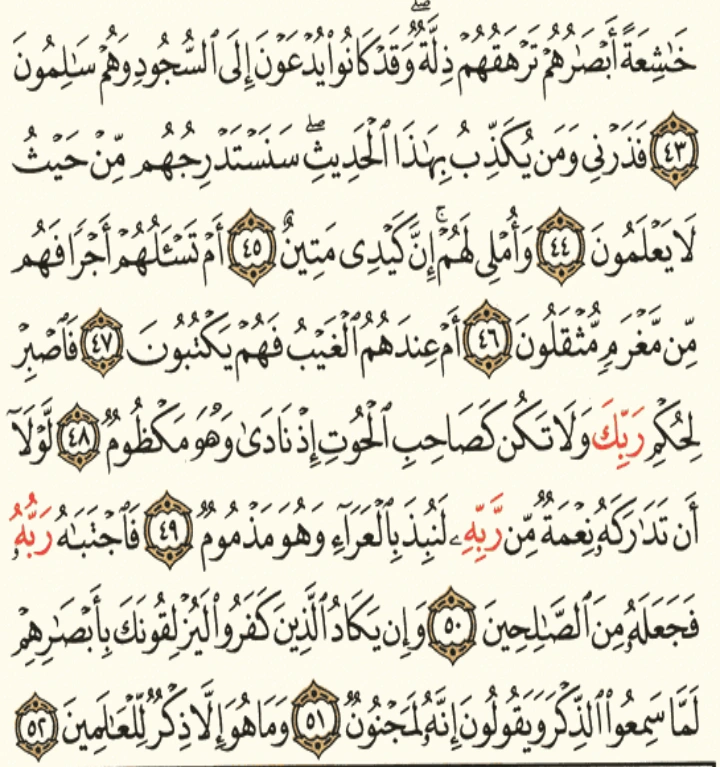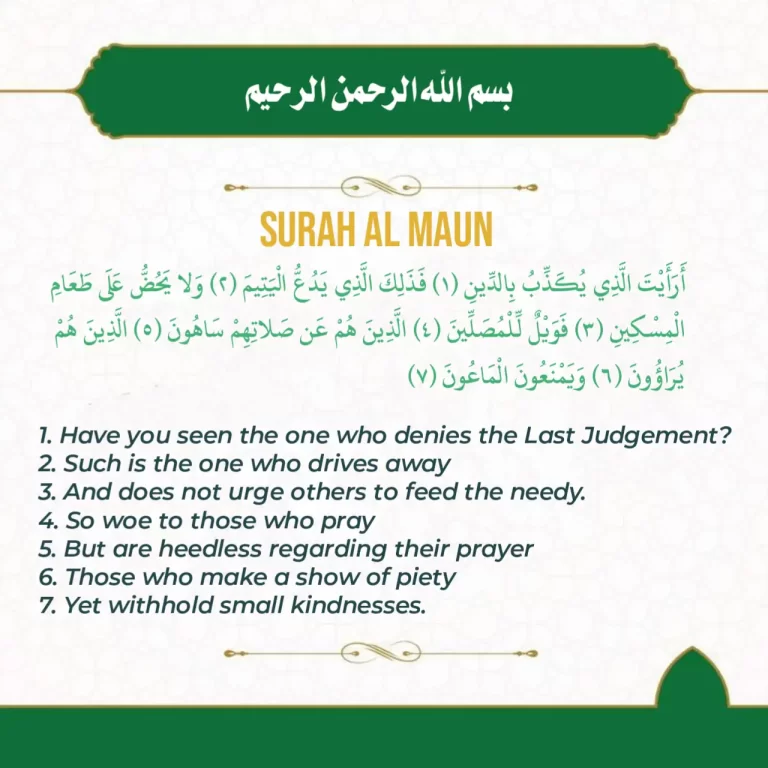Surah Qalam Transliteration, Arabic, And English Translation
Surah qalam 68th chapter of the Qur’an with 52 verses. This surah describes Allah’s justice and the judgment day. Three notable themes of this Surah are its response to the opponents’ objections, warning and admonition to the disbelievers, and exhortation of patience to the prophet Muhammad.
Advertisements
Surah Al Qalam Summary
| Classification | Makkah |
| Number of verses | 52 |
| Surah before | Al-Mulk |
| Surah after | Al-Haaqqa |
| Name | The Pen |
| Position | 29 juz |
Surah Al Qalam in Arabic
- بِسْمِ اللَّهِ الرَّحْمَٰنِ الرَّحِيمِ
- 1. ن ۚ وَالْقَلَمِ وَمَا يَسْطُرُونَ
- 2. مَا أَنْتَ بِنِعْمَةِ رَبِّكَ بِمَجْنُونٍ
- 3. وَإِنَّ لَكَ لَأَجْرًا غَيْرَ مَمْنُونٍ
- 4. وَإِنَّكَ لَعَلَىٰ خُلُقٍ عَظِيمٍ
- 5. فَسَتُبْصِرُ وَيُبْصِرُونَ
- 6. بِأَيْيِكُمُ الْمَفْتُونُ
- 7. إِنَّ رَبَّكَ هُوَ أَعْلَمُ بِمَنْ ضَلَّ عَنْ سَبِيلِهِ وَهُوَ أَعْلَمُ بِالْمُهْتَدِينَ
- 8. فَلَا تُطِعِ الْمُكَذِّبِينَ
- 9. وَدُّوا لَوْ تُدْهِنُ فَيُدْهِنُونَ
- 10. وَلَا تُطِعْ كُلَّ حَلَّافٍ مَهِينٍ
- 11. هَمَّازٍ مَشَّاءٍ بِنَمِيمٍ
- 12. مَنَّاعٍ لِلْخَيْرِ مُعْتَدٍ أَثِيمٍ
- 13. عُتُلٍّ بَعْدَ ذَٰلِكَ زَنِيمٍ
- 14. أَنْ كَانَ ذَا مَالٍ وَبَنِينَ
- 15. إِذَا تُتْلَىٰ عَلَيْهِ آيَاتُنَا قَالَ أَسَاطِيرُ الْأَوَّلِينَ
- 16. سَنَسِمُهُ عَلَى الْخُرْطُومِ
- 17. إِنَّا بَلَوْنَاهُمْ كَمَا بَلَوْنَا أَصْحَابَ الْجَنَّةِ إِذْ أَقْسَمُوا لَيَصْرِمُنَّهَا مُصْبِحِينَ
- 18. وَلَا يَسْتَثْنُونَ
- 19. فَطَافَ عَلَيْهَا طَائِفٌ مِنْ رَبِّكَ وَهُمْ نَائِمُونَ
- 20. فَأَصْبَحَتْ كَالصَّرِيمِ
- 21. فَتَنَادَوْا مُصْبِحِينَ
- 22. أَنِ اغْدُوا عَلَىٰ حَرْثِكُمْ إِنْ كُنْتُمْ صَارِمِينَ
- 23. فَانْطَلَقُوا وَهُمْ يَتَخَافَتُونَ
- 24. أَنْ لَا يَدْخُلَنَّهَا الْيَوْمَ عَلَيْكُمْ مِسْكِينٌ
- 25. وَغَدَوْا عَلَىٰ حَرْدٍ قَادِرِينَ
- 26. فَلَمَّا رَأَوْهَا قَالُوا إِنَّا لَضَالُّونَ
- 27. بَلْ نَحْنُ مَحْرُومُونَ
- 28. قَالَ أَوْسَطُهُمْ أَلَمْ أَقُلْ لَكُمْ لَوْلَا تُسَبِّحُونَ
- 29. قَالُوا سُبْحَانَ رَبِّنَا إِنَّا كُنَّا ظَالِمِينَ
- 30. فَأَقْبَلَ بَعْضُهُمْ عَلَىٰ بَعْضٍ يَتَلَاوَمُونَ
- 31. قَالُوا يَا وَيْلَنَا إِنَّا كُنَّا طَاغِينَ
- 32. عَسَىٰ رَبُّنَا أَنْ يُبْدِلَنَا خَيْرًا مِنْهَا إِنَّا إِلَىٰ رَبِّنَا رَاغِبُونَ
- 33. كَذَٰلِكَ الْعَذَابُ ۖ وَلَعَذَابُ الْآخِرَةِ أَكْبَرُ ۚ لَوْ كَانُوا يَعْلَمُونَ
- 34. إِنَّ لِلْمُتَّقِينَ عِنْدَ رَبِّهِمْ جَنَّاتِ النَّعِيمِ
- 35. أَفَنَجْعَلُ الْمُسْلِمِينَ كَالْمُجْرِمِينَ
- 36. مَا لَكُمْ كَيْفَ تَحْكُمُونَ
- 37. أَمْ لَكُمْ كِتَابٌ فِيهِ تَدْرُسُونَ
- 38. إِنَّ لَكُمْ فِيهِ لَمَا تَخَيَّرُونَ
- 39. أَمْ لَكُمْ أَيْمَانٌ عَلَيْنَا بَالِغَةٌ إِلَىٰ يَوْمِ الْقِيَامَةِ ۙ إِنَّ لَكُمْ لَمَا تَحْكُمُونَ
- 40. سَلْهُمْ أَيُّهُمْ بِذَٰلِكَ زَعِيمٌ
- 41. أَمْ لَهُمْ شُرَكَاءُ فَلْيَأْتُوا بِشُرَكَائِهِمْ إِنْ كَانُوا صَادِقِينَ
- 42. يَوْمَ يُكْشَفُ عَنْ سَاقٍ وَيُدْعَوْنَ إِلَى السُّجُودِ فَلَا يَسْتَطِيعُونَ
- 43. خَاشِعَةً أَبْصَارُهُمْ تَرْهَقُهُمْ ذِلَّةٌ ۖ وَقَدْ كَانُوا يُدْعَوْنَ إِلَى السُّجُودِ وَهُمْ سَالِمُونَ
- 44. فَذَرْنِي وَمَنْ يُكَذِّبُ بِهَٰذَا الْحَدِيثِ ۖ سَنَسْتَدْرِجُهُمْ مِنْ حَيْثُ لَا يَعْلَمُونَ
- 45. وَأُمْلِي لَهُمْ ۚ إِنَّ كَيْدِي مَتِينٌ
- 46. أَمْ تَسْأَلُهُمْ أَجْرًا فَهُمْ مِنْ مَغْرَمٍ مُثْقَلُونَ
- 47. أَمْ عِنْدَهُمُ الْغَيْبُ فَهُمْ يَكْتُبُونَ
- 48. فَاصْبِرْ لِحُكْمِ رَبِّكَ وَلَا تَكُنْ كَصَاحِبِ الْحُوتِ إِذْ نَادَىٰ وَهُوَ مَكْظُومٌ
- 49. لَوْلَا أَنْ تَدَارَكَهُ نِعْمَةٌ مِنْ رَبِّهِ لَنُبِذَ بِالْعَرَاءِ وَهُوَ مَذْمُومٌ
- 50. فَاجْتَبَاهُ رَبُّهُ فَجَعَلَهُ مِنَ الصَّالِحِينَ
- 51. وَإِنْ يَكَادُ الَّذِينَ كَفَرُوا لَيُزْلِقُونَكَ بِأَبْصَارِهِمْ لَمَّا سَمِعُوا الذِّكْرَ وَيَقُولُونَ إِنَّهُ لَمَجْنُونٌ
- 52. وَمَا هُوَ إِلَّا ذِكْرٌ لِلْعَالَمِينَ
Surah Qalam Transliteration
- Noon; walqalami wa maa yasturoon.
- Maa anta bini’mati Rabbika bimajnoon.
- Wa inna laka la ajran ghaira mamnoon.
- Wa innaka la’alaa khuluqin ‘azeem.
- Fasatubsiru wa yubsiroon.
- Bi ayyikumul maftoon.
- Innaa Rabbaka Huwa a’lamu biman dalla ‘an sabeelihee wa Huwa a’lamu bilmuhtadeen.
- Falaa tuti’il mukazzibeen.
- Waddoo law tudhinu fa-yudhinoon.
- Wa laa tuti’ kulla hallaa fim maheen.
- Hammaazim mash shaaa’im binameem.
- Mannaa’il lilkhairi mu’tadin aseem.
- Utullim ba’da zaalika zaneem.
- An kaana zaa maalinw-wa baneen.
- Izaa tutlaa ‘alaihi aayaatunaa qaala asaateerul awwaleen.
- Sanasimuhoo ‘alal khurtoom.
- Innaa balawnaahum kamaa balawnaaa As-haabal jannati iz ‘aqsamoo la-yasri munnahaa musbiheen.
- Wa laa yastasnoon.
- Fataafa ‘alaihaa taaa’i fum mir rabbika wa hum naaa’imoon.
- Fa asbahat kassareem.
- Fatanaadaw musbiheen.
- Anighdoo ‘alaa harsikum in kuntum saarimeen.
- Fantalaqoo wa hum yatakhaafatoon.
- Al laa yadkhulannahal yawma ‘alaikum miskeen.
- Wa ghadaw ‘alaa hardin qaadireen.
- Falammaa ra awhaa qaalooo innaa ladaaalloon.
- Bal nahnu mahroomoon.
- Qaala awsatuhum alam aqul lakum law laa tusabbihoon.
- Qaaloo subhaana rabbinaaa innaa kunnaa zaalimeen.
- Fa aqbala ba’duhum ‘alaa ba’diny yatalaawamoon.
- Qaaloo yaa wailanaaa innaa kunnaa taagheen.
- Asaa rabbunaaa any yubdilanaa khairam minhaaa innaaa ilaa rabbinaa raaghiboon.
- Kazaalikal azaab, wa la’azaabul aakhirati akbar; law kaanoo ya’lamoon.
- Inna lilmuttaqeena ‘inda rabbihim jannaatin na’eem.
- Afanaj’alul muslimeena kalmujrimeen.
- Maa lakum kaifa tahkumoon.
- Am lakum kitaabun feehi tadrusoon.
- Inna lakum feehi lamaa takhaiyaroon.
- Am lakum aymaanun ‘alainaa baalighatun ilaa yawmil qiyaamati inna lakum lamaa tahkumoon.
- Salhum ayyuhum bizaa lika za’eem.
- Am lahum shurakaaa’u fal ya’too bishurakaaa ‘ihim in kaanoo saadiqeen.
- Yawma yukshafu ‘an saaqinw wa yud’awna ilas sujoodi falaa yastatee’oon.
- Khaashi’atan absaaruhum tarhaquhum zillatunw wa qad kaanoo yud’awna ilassujoodi wa hum saalimoon.
- Fazarnee wa many yukazzibu bihaazal hadeesi sanastad rijuhum min haisu laa ya’lamoon.
- Wa umlee lahum; inna kaidee mateen.
- Am tas’aluhum ajran fahum min maghramin musqaloon.
- Am ‘indahumul ghaibu fahum yaktuboon.
- Fasbir lihukmi rabbika wa laa takun kasaahibil hoot; iz naadaa wa huwa makzoom.
- Law laaa an tadaara kahoo ni’matum mir rabbihee lanubiza bil’araaa’i wa huwa mazmoom.
- Fajtabaahu rabbuhoo faja’alahoo minas saaliheen.
- Wa iny-yakaadul lazeena kafaroo la-yuzliqoonaka biabsaarihim lammaa sami’uz-Zikra wa yaqooloona innahoo lamajnoon.
- Wa maa huwa illaa zikrul lil’aalameen.
Surah Qalam Translation In English
- 1. Noon. By the pen and what they write,
- 2. You O Muhammad] are not, by the grace of your Lord, a madman.
- 3. Verily you will have a never-ending reward,
- 4. and verily you are of an exalted character.
- 5. So you will see, and they will see,
- 6. Which of you is confused.
- 7. Verily your Lord knows best who has gone astray from His path, and He knows best who is rightly guided.
- 8. So do not yield to the disbelievers.
- 9. They wish that you would compromise, so that they too would compromise.
- 10. And do not yield to any contemptible oath-monger,
- 11. a backbiter who goes about with malicious gossip,
- 12. withholding good, transgressing beyond bounds, steeped in sin,
- 13. harsh and, furthermore, ignoble.
- 14. Because he has wealth and sons,
- 15. when Our revelations are recited to him, he says: This is nothing but tales of the ancients.
- 16. We will mark him on the snout.
- 17. Verily We have tested them [the people of Makkah] as We tested the people of the garden, when they swore to harvest its fruits the following morning,
- 18. and made no allowance [for the will of Allah],
- 19. So a visitation from your Lord came upon it whilst they slept,
- 20. And it [was burned] and turned black as night.
- 21. And in the morning they called out to one another:
- 22. Let us go early to our garden, if we want to harvest its fruits.
- 23. So they set out, whispering to one another:
- 24. We should definitely not let any poor person enter the garden today.
- 25. And they set out quickly, thinking that they were able to do what they had resolved to do.
- 26. But when they saw the garden, they said: We must have lost our way!
- 27. [Then they said:] Nay, rather we have been deprived [of its fruits]!
- 28. The best of them said: Did I not say to you: Why do you not glorify Allah [and refrain from withholding charity]?
- 29. They said: Glory be to our Lord; we were indeed wrongdoers.
- 30. Then they turned upon one another with reproaches.
- 31. They said: Woe to us! We have indeed transgressed.
- 32. Perhaps our Lord will give us a better one in its place; verily to our Lord we turn in hope.
- 33. Such is the punishment [in this world]; and the punishment of the hereafter is greater, if only they knew.
- 34. Verily for those who are pious, there are gardens of delight with their Lord.
- 35. Are We to treat those who have submitted [in Islam] in the same way as the evildoers?
- 36. What is the matter with you, that you judge as you do?
- 37. Or do you have a scripture from which you learn
- 38. that you will be given whatever you choose?
- 39. Or have you received a solemn promise, binding upon Us until the Day of Resurrection, that you will have whatever you decide?
- 40. Ask them which of them can guarantee that.
- 41. Or do they have associates [who will vouch for them]? Then let them bring their associates, if they are telling the truth.
- 42. On the day when the dreadful calamity unfolds, when they are called upon to prostrate, they will not be able to do so.
- 43. Their eyes downcast, humiliation will overwhelm them, for they had been called upon to prostrate when they were whole and able to do so [but they refused].
- 44. So leave Me [to deal] with those who reject this discourse [the Qur’an]; We will lead them step by step to their ruin, without their even realising it.
- 45. I will give them respite, for My stratagem is sure.
- 46. Or is it that you are asking them for recompense which they find too burdensome?
- 47. Or do they have knowledge of the unseen, which they are writing down?
- 48. So be patient with the decree of your Lord, and do not be like the one who was swallowed by the fish [namely Yoonus], when he called out in distress.
- 49. Had it not been for grace from his Lord that reached him, he would surely have been cast up, blameworthy, upon the barren shore.
- 50. So his Lord chose him, and made him one of the righteous.
- 51. Those who disbelieve almost strike you down with their malicious stares when they hear the reminder [the Qur’an], and they say: He is surely insane!
- 52. It [the Qur’an] is but a reminder to the worlds.
Surah Qalam Full Images



Tafsir And Meaning Of Surah Al Qalam
Allah swears by the pen, which includes all pens that are used to write different kinds of knowledge and with which prose and poetry are written.
That is because the pen, and what is written with it of all kinds of words, is one of the great signs of Allah; it deserves that Allah should swear by it to the innocence of His Prophet Muhammad of what his enemies attributed to him of insanity.
Allah states that he was not a madman, by the grace and kindness of his Lord, for He had blessed him with perfect reasoning, mature thinking and concise speech which was the best that pens could record and people could write down.
That is true bliss in this world.
Advertisements
Then Allah mentions his bliss in the hereafter, as He says:
Verily you will have a never-ending reward that is, a great reward, as is indicated by the indefinite form of the word.
Never-ending that is, unceasing; rather it will be ongoing and eternal.
That is because of what the Prophet did previously of righteous deeds and because of his sublime character.
Therefore Allah says: and verily you are of an exalted character that is, a sublime character, for you have attained an exalted position by virtue of your exalted character, with which Allah blessed you.
Advertisements
His exalted character may be summed up by the way the Mother of the Believers ‘A’ishah explained it to the one who asked her about it. She said: His character was the Qur’an.
There are similar verses which indicate that the Prophet possessed the noblest of characteristics, and which encourage us to strive to attain an exalted character.
He possessed the best and noblest of characteristics, in each of which he attained the ultimate degree.
Advertisements
He was easy-going and gentle, and was close to people.
He would accept the invitation of anyone who invited him, meet the need of anyone who asked him for help, and respond kindly to anyone who asked of him, never turning anyone away empty-handed.
If his Companions suggested something to him, he would agree with them and go along with them, provided that there were no shar’i reservations concerning it.
If he wanted to decide about a matter, he would not make a decision concerning it without their involvement; rather he would consult them and seek their advice.
He would show appreciation to those among them who did good and forgive those who caused offence.
He never sat and talked to anyone without showing the best behaviour and attitude towards him; he would never frown at him or speak harshly to him, and he never stopped being cheerful with him;
He would not take him to task for slips of the tongue, and he would overlook anything he showed of roughness; rather he would treat him extremely kindly and show great forbearance towards him.
And Allah indeed made it clear that he was the most guided of people and the most perfect of them in and of himself and in his attitude towards others, whereas his enemies were the most misguided of people and the worst of people in their attitude towards others.
It is they who sought to confuse the slaves of Allah and lead them astray from His path.
It is enough that Allah knows that about them, for it is He Who brings people to account and requites them for their deeds.
Verily your Lord knows best who has gone astray from His path, and He knows best who is rightly guided.
This is a threat to those who have gone astray and a promise to those who follow true guidance, and it highlights the wisdom of Allah, as He guides those who are fit to receive guidance, to the exclusion of others.
Hence Allah says: They namely the polytheists wish that you would compromise that is, that you would agree to some of what they follow, either in word or deed, or by keeping quiet concerning issues that you should make clear, so that they too would compromise.
Rather you should convey the commands of Allah and preach the religion of Islam openly.
And part of preaching it openly is denouncing its opposite and criticising that which is contrary to it.
And do not yield to any contemptible oath-monger that is, one who swears a lot of oaths, because such a person can only be a liar.
And whoever is a liar cannot but be contemptible that is, base and vile, lacking in wisdom, with no aspirations for good; rather all his aspirations are connected to base physical desires.
A backbiter that is, one who criticises people a great deal and speaks ill of them, gossiping about them, mocking them and so on.
To sum up, Allah forbids yielding to any vile oath monger and liar who has the worst of characteristics, especially characteristics that include self-admiration and arrogance towards the truth and towards people, who looks down on people and therefore backbites and spreads malicious gossip, criticising them, and who commits a great deal of sin.
Then Allah says: verily We have tested these people who deny the truth, and We have given them respite and bestowed upon them whatever We will of wealth, children, long life and so on.
That is in accordance with their wishes, not because they are dear to Us, but so that they may be led step-by-step to their ruin, without realising that this is Our plan.
Their being deceived by that is similar to the way in which the owners of the garden, who were partners therein, were deceived when the fruit ripened and the trees were laden with fruit, and the time had come to harvest it, and they were certain that it was within their grasp and under their control, and that there was nothing to prevent them from that.
Therefore they swore that they would harvest it in the morning, without making any allowance (for the will of Allah).
They did not realise that Allah was watching and that the punishment would reach them before that.
So a visitation from your Lord that is, a punishment that befell it at night came upon it whilst they slept, and destroyed it completely.
And it [was burned] and turned black as night that is, like a dark night.
All its trees and fruits were gone, but they were not aware of this painful reality.
Hence they called out to one another the following morning, saying to one another:
Let us go early to our garden, if we want to harvest its fruits.
So they set out heading towards it, whispering to one another, discussing how to withhold the dues of Allah, and saying:
We should definitely not let any poor person enter the garden today that is, they went early, before other people were out and about, and advised one another to withhold any charity from the poor and needy.
Out of stinginess and extreme caution, they spoke in whispers lest anyone hear them and tell the poor about that.
And they set out with that reprehensible attitude of hardheartedness and lack of compassion (quickly, thinking that they were able to do what they had resolved to do) namely to withhold the dues of Allah, and certain of their ability to achieve that.
But when they saw the garden in the condition described by Allah, having turned black as night, they said in their confusion and distress:
We must have lost our way; perhaps this is not it.
When they realised that it was indeed their garden, and came to their senses, they said:
Nay, rather we have been deprived [of its fruits]!
At that point they realised that it was a punishment.
The best of them that is, the most just and fair-minded of them said:
Did I not say to you: Why do you not glorify Allah [and refrain from withholding charity] That is, why did you not declare Allah to be above all that is not befitting to Him, which includes your thinking that your power is independent.
If you had made an allowance for the will of Allah and said, if Allah wills thus making your will subject to the will of Allah, this would not have happened to you.
They said: Glory be to our Lord; we were indeed wrongdoers that is, after that they realised their error, but that was after the punishment had befallen their garden and could not be lifted.
But perhaps the glorification of Allah and their acknowledgement of their wrongdoing benefited them by reducing their burden of sin; perhaps these words reflected repentance on their part, and immense regret.
Then they turned upon one another with reproaches, blaming one another for what they had done.
They said: Woe to us! We have indeed transgressed that is, we overstepped the mark with regard to the rights of Allah and the rights of His slaves.
Perhaps our Lord will give us a better one in its place; verily to our Lord we turn in hope.
They hoped that Allah would give them something better than it, and they promised that they would turn in hope to Allah and would persist in that in this worldly life.
If they did what they promised, it seems that Allah would have replaced it with something better than it in this world, because whoever calls upon Allah sincerely, turning to Him in hope, He will give him what he seeks.
Then Allah says, commenting on what happened:
Such is the punishment [in this world] for the one who does that which incurs punishment:
Allah will take away from His slave the thing that caused him to transgress and be arrogant, and to give precedence to the life of this world;
He will take it away from him at the time when he needs it most.
And the punishment of the hereafter is greater than the punishment of this world (if only they knew), for whoever knows that will inevitably be deterred from anything that may incur the punishment.
Then Allah tells us of what He has prepared for the pious who avoid disbelief and sin, of all kinds of delights and a life of peace in closeness to the Most Generous.
And He tells us that His wisdom does not dictate that He should make the Muslims who are devoted to their Lord, comply with His commands and seek His pleasure like the evildoers who persist in disobeying Him, denying His signs and revelations, opposing His Messengers and fighting His close friends.
Whoever thinks that Allah will reward them equally is mistaken; his judgement is false and his thinking is corrupt.
If the evildoers think that, they have no evidence and no scripture from which they learn or which they recite to tell them that they will be among the people of paradise and will have whatever they want or choose.
They have no covenant w ith Allah and no solemn promise that is binding upon Him until the Day of Resurrection that they will have whatever they choose, and they have no partners or supporters who will help them to get whatever they want.
If they do have partners and supporters, then let them bring them, if they are telling the truth.
It is well known that they have none of these things.
They have no scripture, they have no promise with Allah of salvation, and they have no partners to help them.
Thus it is known that their claim is utterly false.
Ask them which of them can guarantee that for no one can guarantee it.
When the Day of Resurrection comes, and troubles, earthquakes and calamities begin to unfold, such as cannot be imagined, and the Creator comes to judge between His slaves and requite them, all creatures will see of the majesty and greatness of Allah that which cannot be expressed.
At that point, they will be called to prostrate to Allah.
The believers, who used to prostrate to Allah willingly and by choice, will prostrate, and the evildoers and hypocrites will try to prostrate, but they will not be able to do so, for their backs will be as solid and inflexible as the horns of cattle, unable to bend.
This is a requital that will match their deeds, for in this world they were called to prostrate to Allah, affirm His oneness and worship Him when they were whole and sound, with no physical defects, but they were too arrogant and refused to do that.
So do not ask about their situation and bad fate on that day, for Allah will be angry with them and the punishment will have become inevitable for them.
They will be utterly helpless, and no regret or excuses will benefit them on the Day of Resurrection.
This should serve as a deterrent against committing sins and should make one strive to make up for what one has missed out on whilst it is still possible to do so.
Hence Allah says: So be patient with the decree of your Lord in terms of both religious and universal decrees.
So the universal decree should be borne with patience if it is hurtful, and should not be responded to with panic and worry.
And the religious decree should be responded to with acceptance and submission, and full compliance with the divine command.
And do not be like the one who was swallowed by the fish namely Yoonus ibn Matta.
What is meant is: do not be like him in the attitude that led to him being detained in the belly of the fish.
That attitude was lack of patience with his people, as was required of him; that led to him departing in anger, as he was angry with his Lord, and he travelled by sea.
Then when the ship became heavy, its passengers and crew drew lots to decide which of them would be thrown overboard so as to lighten the load, and Yoonus lost the draw.
When he called out in distress when he was in the belly of the fish, which was a confined space, therefore he called out in distress, saying:
…There is no god but You. Glory be to You; I have indeed done wrong. (al-Anbiya ’21: 87)
Allah answered his prayer, and the fish cast him up, sick, on the barren shore, where Allah caused a gourd vine to grow for him.
Hence Allah says here:
Had it not been for grace from his Lord that reached him, he would surely have been cast up, blameworthy, upon the barren shore^ that is, he would have been cast up on the barren shore, which is empty land, blameworthy, but Allah bestowed His mercy upon him.
He could have been cast up blameworthy, but because of divine grace, he was cast up praiseworthy and became better than he had been originally.
Hence Allah says: So his Lord chose him that is, He chose him, selected him and purified him and made him one of the righteous that is, one of those whose words, deeds, intentions and attitudes are righteous.
Our Prophet Muhammad obeyed the command of his Lord, and was patient with the decree of his Lord in a manner that was unmatched by anyone else in creation.
And his enemies could not cause him any harm except that it backfired on them.
They were even keen to strike him down with their malicious stares, because of their envy, rage and resentment.
This was the most that they could do in terms of physical harm, but Allah protected and supported him. In terms of verbal harm, they said things concerning him based on what they thought in their hearts.
This noble Qur’an, the wise reminder, is but a reminder to the worlds, to make them think of that which is best for them in both spiritual and worldly terms.
This is the end of the commentary on Soorat al-Qalam.
All praise and thanks are for Allah, and may the blessings and peace of Allah be upon Prophet Muhammad, his family, and his Companions abundantly until the Day of Judgement.
Read also Surah Muhammad Full Transliteration And Translation In English
Advertisements








3 Comments